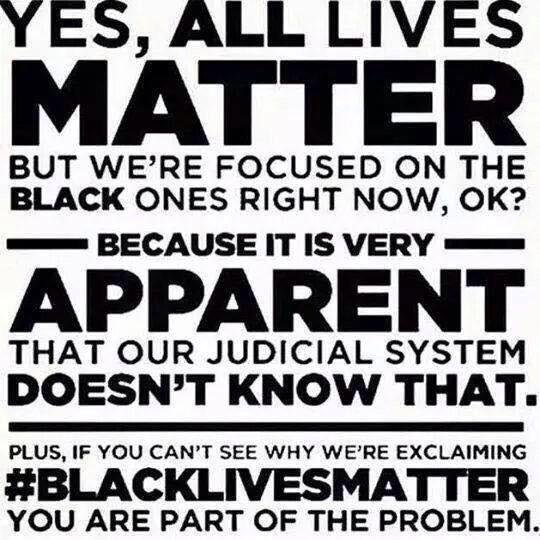I would rather be reading romance. It’s my daily escape that makes a long commute feel short and it’s also encouraging to read about people with complicated lives and emotions who nonetheless get happily-ever-afters.
But I can’t read romance when my heart is breaking, so instead I have to write about murder.
I am ashamed that it has taken me this long to feel the anguish and outrage and heartbreak. My excuse is that I didn’t have the bandwidth—I’ve been traveling and extending myself to dear friends and family, and thus less attuned to the news and the public sphere.
Still, I heard about Alton Sterling and it saddened but did not shock me. Almost instantly, it seemed, the federal Justice Department began an investigation and I found that borderline reassuring: at least something right was being done.
And then Philando Castile died so quickly on Alton’s heels that at first I couldn’t distinguish the two news stories. That’s mostly because I wasn’t paying attention to the news, but it also says something about how commonplace such shootings have become.
Still, I was silent. My workplace was not, for which I am grateful, but I allowed them to speak for me because I had not yet processed the horror—it sometimes simply feels like too much. It is too much. I would rather read romance.
Then I woke up this morning to an alert that police officers had been shot at a Dallas protest. I grew up in Dallas. My high school mentor is married to a police officer.
Suddenly it felt personal.
Wake up, speak up
I am ashamed that I resisted feeling the full impact of what has happened this week until I was forced to. Part of me feels like a traitor to the advocacy of human rights: I profess compassion for all, but my heart was not truly crushed until the crises hit home.
And yet I suspect I’m not alone. I suspect there are others who, while genuinely perturbed by the repetitive violence against black Americans, have not felt compelled to raise their voices until now, when white police officers have also been murdered.
I am so afraid these additional murders will create a schism and distraction. People who should be outraged that police regularly murder and abuse black Americans will now be outraged that black Americans murdered police.
(Oh and by the way, I realize that, as of this writing, the Dallas shooters have not actually been identified—but we may as well assume they were black Americans; even if the truth proves otherwise, that is what everyone will think anyway. Because we are thoroughly conditioned to equate “black” with “criminal.”)
And in my efforts to bridge that potential schism, I was tempted to say something about how all lives matter. Except that is not the point.
Of course all lives matter. And all murder is wrong. But it’s the racially motivated ones we most need to address. It’s the black lives we are disrespecting, devaluing most.
The very fact that #blacklivesmatter has become a hashtag and a movement is the depressing evidence that it needs to exist.
Professing that “all lives matter” comes across as a rebuttal, not an affirmation, that black lives are important. And sadly, this country needs to prove that it believes black lives are important.
Leveraging privilege
I am a white woman who has not always acknowledged her privilege. At first I denied it because it made me uncomfortable: I truly believe we are all inherently equal, so I could not face the present reality that in practice, we are not.
In practice, I am incredibly privileged.
Thankfully I have grown to understand that being privileged is not my fault, but it is a responsibility.
Because I am not subject to the same discrimination as many of my fellow American citizens, because I was gifted an extraordinary education and the ability to write well, because I have the legal rights and the physical means to widely express my views, I am not allowed to stay silent.
To stay silent is the one privilege I will no longer leverage.
This morning I prayed about our nation’s situation. “What can I do about all this police violence?” I asked. This is what I was told:
“Your awareness is the best beginning. Do not stay silent. You can use the Internet to learn and act. Ally yourself with those who are speaking truth and wisdom.”
So when my meditation concluded, I went on Facebook.
For the last month I’ve been on a Facebook fast (or more accurately, a heavily restricted diet), precisely because the flood of thoughts and feelings, often uninformed, can be detrimental to my state of mind. But nearly the first thing I saw strengthened my core.
I saw a post—a poem, a prayer—that confessed the same cowardice and humility I’ve been grappling with. It was written by a woman with whom I once taught yoga, and whose presence has been on my Facebook feed forever since. Maybe precisely so that all these years later I would see her words:
#saytheirnames
I am sorry
for being fearful.
A coward,
so fearful,
I sometimes hesitate to speak
when it matters most.
What, after all
is the worst they will do to me?
They may ridicule or deride,
but my son will never
fear a hoodie.
Instead he will be cloaked
in the privilege
of pale skin.
I am so sorry.
I know it’s not enough.
Words
are not enough
Nothing
will ever be enough
to replace
your fathers
your brothers
your sons.
I am sorry
we are so broken
hearts are so closed
minds are so fearful.
I am sorry
your righteous anger
is not enough
to awaken us.
We are lost.
Your strength
in the face of such
terror
is unfathomable,
mesmerizing,
enviable.
I am sorry
so many of us
do not carry the same
courage.
What privilege,
to live free
from such a burden,
to choose to stay silent.
Though I know
in this time of grief
it offers no comfort
I swear to you,
I will
always
say their names.
Increasing accountability
Saying their names is a start. It is a good start. Awareness is indeed the best beginning.
But although Kayla’s poem, and hopefully this writing, may increase awareness, more action is necessary.
A few months ago I read Michelle Alexander’s The New Jim Crow, Alice Goffman’s On the Run, Ta-Nahesi Coates’s Between the World and Me, and Shaka Senghor’s Writing My Wrongs. Those books opened my eyes (and maybe also explain a bit why I’ve taken to reading lighter fare on my commutes), and I highly recommend them.
For me, my next steps include (a) following leaders like ShiShi Rose and learning from the people most affected how I can be most supportive, and (b) digging into the legislative logistics of criminal justice reform so that I can effectively communicate with my elected representatives.
It feels a little futile, the whole, “write to your representatives” route, but governmental decisions have heavily influenced the current climate of injustice, so I figure they can fix it, too.
But that can only happen if people act with empathy and love. So I will be one of those people. I hope you will too.
Love > fear,


